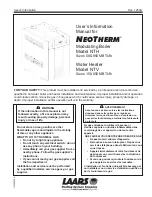
17
1 WARNING
Prior to performing any operation on the machine,
make sure that you have thoroughly read and under-
stood the contents of this manual. Do not perform
modifications or maintenance operations which are
not prescribed.
For any doubt or problem regarding the use of the machine,
even if not described herein, consult qualified personnel.
The productor cannot be held responsible for damage to per-
sons or property caused by the operator's failure to read or
apply the contents of this manual.
1.1 Operator and other persons' protection
The welding process is a noxious source of radiations, noise,
heat and gas emissions. Persons fitted with pacemakers must
consult their doctor before undertaking arc welding or plasma
cut operations. If the above prescription is not observed, the
manufacturer accepts no liability for any damages sustained in
the event of an accident.
1.1.1 Personal protection
- Do not wear contact lenses!!!
- Keep a first aid kit ready for use.
- Do not underestimate any burning or injury.
- Wear protective clothing to protect your skin from the arc rays,
sparks or incandescent metal, and a helmet or a welding cap.
- Wear masks with side face guards and suitable protection fil-
ter (at least NR10 or above) for the eyes.
- Use headphones if dangerous noise levels are reached during
the welding.
Always wear safety goggles with side guards, especially during
the manual or mechanical removal of welding slags.
- lf you feel an electric shock, interrupt the welding ope-
rations immediately.
- The operator must not touch two torches or two electrode
holders at the same time.
1.1.2 Other persons' protection
- Position a fire-retardant partition to protect the surroun-
ding area from rays, sparks and incandescent slags.
- Advise any person in the vicinity not to stare at the arc or at
the incandescent metal and to get an adequate protection.
- lf the noise level exceeds the limits prescribed by the law,
delimit the work area and make sure that anyone getting
near it is protected with headphones or earphones.
1.2 Protection against fumes and gases
Fumes, gases and powders produced during the welding
process can be noxious for your health.
- Do not use oxygen for the ventition.
- Provide for proper ventilation, either natural or forced, in the
work area.
- In case of welding in extremely small places the work of the ope-
rator carrying out the weld should be supervised by a colleague
standing outside.
- Position gas cylinders outdoors or in places with good ventilation.
- Do not perform welding operations near degreasing or painting
stations.
1.3 Fire/explosion prevention
The welding process may cause fires and/or explosions.
- Clear the work area and the surrounding area from any infiam-
mable or combustible materials or objects.
- Position a fire-fighting device or material near the work area.
- Do not perform welding or cutting operations on closed
containers or pipes.
- lf said containers or pipes have been opened, emptied and
carefully cleaned, the welding operation must in any case be
performed with great care.
- Do not weld in places where explosive powders, gases or
vapours are present.
- Do not perform welding operations on or near containers
under pressure.
- Don’t use this machine to defrost pipes.
1.4 Electromagnetic compatibility (EMC)
This device is built in compliance with the indications contained
in the harmonized standard EN60974-10, to which the opera-
tor must refer for the use of this apparatus.
- lnstall and use the apparatus keeping to the instructions given
in this manual.
- This device must be used for professional applications only, in
industrial environments It is important to remember that it
may be difficult to ensure the electromagnetic compatibility
in other environments.
1.4.1 Installation, use and area examination
- The user must be an expert in the sector and as such is
responsible for installation and use of the equipment accor-
ding to the manufacturer's instructions.
lf any electromagnetic disturbance is noticed, the user must
soave the problem, if necessary with the manufacturer's tech-
nical assistance.
- In any case electromagnetic disturbances must be reduced
until they are not a nuisance any longer.
- Before installing this apparatus, the user must evaluate the
potential electromagnetic problems that may arise in the
surrounding area, considering in particular the health con-
ditions of the persons in the vicinity, for example of per-
sons fitted with pacemakers or hearing aids.
1.4.2 Emission reduction methods
MAINS POWER SUPPLY
- The welding power source must be connected to the sup-
ply mains according to the manufacturer's instructions.
In case of interference, it may be necessary to take further pre-
cautions like the filtering of the mains power supply.
lt is also necessary to consider the possibility to shield the power
supply cable.
WELDING AND CUTTING CABLES
The welding cables must be kept as short as possible, positioned
near one another and laid at or approximately at ground level.
EQUIPOTENTIAL CONNECTION
The earth connection of all the metal component in the wel-
ding installation and near it must be taken in consideration.
However, the metal component connected to the work-piece
will increase the risk of electric shock for the operator, if he
touches said metal component and the electrode at the same
time.
Therefore, the operator must be insulated from all the earthed
metal component.
The equipotential connection must be made according to the
national regulations.
EARTHING THE WORKPIECE
When the workpiece is not earthed for electrical safety reasons
or due to its size and position, the earthing of the workpiece
may reduce the emissione. It is important to remember that the
earthing of the workpiece should neither increase the risk of
accidents for the operators, nor damage other electric equip-
ment.
The earthing must be made according to the national regula-
tions.
















































